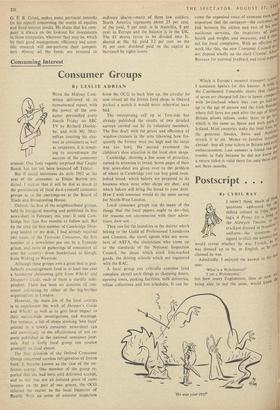Consuming Interest
Consumer Groups
By LESLIE ADRIAN
WITH the Molony Com- mittee delivered of its
monumental report, with the power of the con- sumer personified every But if social historians do style 1962 as the year of the consumer, as Elaine Burton pre- dicted. I reckon that it will be due as much to the germination of local do-it-yourself consumer groups as to the carryings-on at the Board of Trade and Broadcasting House.
Oxford, the first of the neighbourhood groups, held its inaugural meeting and published its first news-sheet in February this year. It took Cam- bridge less than five months to follow suit. But by the time the first number of Cambridge Shop- ping landed on my desk, I had already received two issues of the Tees-side Consumer, the first number of a news-letter put out by a Tyneside group. and news of gatherings of consumers all over the country—from Sunderland to Slough, from Woking to Wearside.
Although these groups owe a great deal to god- fatherly encouragement (and in at least one case a handsome christening gift) from Which? and Shopper's Guide, each of them is sturdily inde- pendent. There has been no question of con- sumer colonising by either of the big-brother organisations in London.
However, the main lob of the local coteries is to supplement the work of Shopper's Guide and Which? as well as to give local impact to their nation-wide investigations and warnings. For 'instance, a list of shops stocking 'best buys' printed in a town's consumer news-sheet can add enormously to the effectiveness of test re- ports published in the national consumer jour- nals. And a lively local group can pounce promptly on local abuses.
The first skirmish of the Oxford Consumer Group concerned careless refrigeration of frozen food. It became known as the case of the un- frozen scampi. One member of the group re- ported that she had been sold defrosted scampi, and as this was not an isolated piece of care- lessness on the part of one grocer, the OCG referred the matter to the local Inspector of Health: With an army of amateur inspectors
from the OCG to back him up, the circular he sent round all the frozen food shops in Oxford packed a punch it would never otherwise have had.
The enterprising cell up at Tees-side has already published the results of two detailed surveys carried out by its voluntary members. The first dealt with the prices and efficiency of window-cleaners in the area (showing how fre- quently the former were too high and the latter was too low); the second examined the children's shoe situation in the local shoe shops.
Cambridge, showing a fine sense of priorities, turned its attention to bread. Seven pages of their first news-sheet are given over to the problem of where in Cambridge you can buy good oven- baked bread; which bakers are prepared to do business when most other shops are shut; and which bakers will bring the bread to your door. How I wish someone would do the same survey for North-West London.
Local consumer groups can do many of the things that the local papers ought to do—but, for reasons not unconnected with their adver- tisers, dare not.
They can list the laundries in the district which belong to the Guild of Professional Launderers and Cleaners, the travel agents who are mem- bers of ABTA, the electricians who come up to the standards of the National Inspection Council, the shops which stock kite-marked goods, the driving schools which are registered with the RAC.
A local group can critically examine (and complain about) such things as shopping hours, opening times, parking facilities, milk deliveries, refuse collections and bus schedules. It can be- come the organised voice of someone even al°11 Important that the ratepayer—the customer; link between the citizen and two of his EnJis. assiduous servants, the inspectors of Oil' health and weights and measures; and a char!: nel for local complaints. With an effective Ile; work like this, the new Consumer Council 0c.e4 not depend wholly on the staid Citizens' AdvIcl Bureaux for national feedback and local suPIO Which is Europe's meanest transport 5ys1c I nominate Spain's for this honour. A tab i1 the Continental Timetable shows that childredl, of seven are charged full fare in Spain, conWare with Switzerland where they can go half-far,: up to the age of sixteen and the Irish RePtibil where full fares are paid after the age of fine Britain allows infants under three to go 1'1 which is the same as Spain and both Parts,,,f); Ireland. Most countries make the limit fol-IG.7 the generous Swedes, Swiss and Austrlafl' stretch it to six. Memo to families travel abroad: buy all your tickets in Britain and av°10 embarrassment. Last summer a friend ran Intl trouble in Italy because he did not know th3 a return ticket is valid there for only three claY5 not three months.






























 Previous page
Previous page